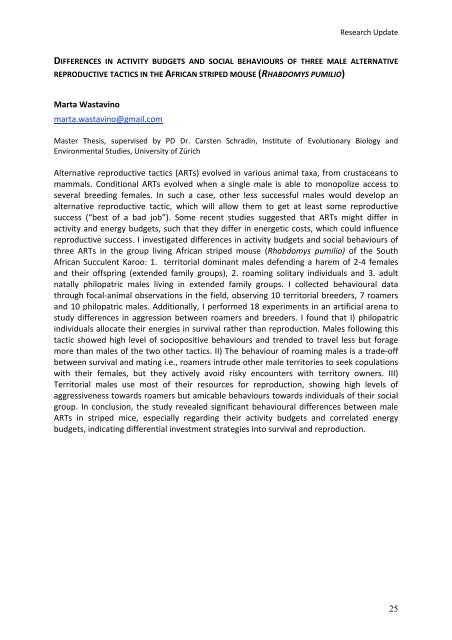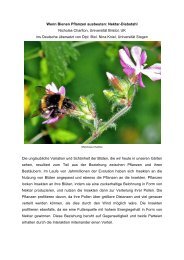PhDâ€theses - Ethologische Gesellschaft
PhDâ€theses - Ethologische Gesellschaft
PhDâ€theses - Ethologische Gesellschaft
You also want an ePaper? Increase the reach of your titles
YUMPU automatically turns print PDFs into web optimized ePapers that Google loves.
Research Update<br />
DIFFERENCES IN ACTIVITY BUDGETS AND SOCIAL BEHAVIOURS OF THREE MALE ALTERNATIVE<br />
REPRODUCTIVE TACTICS IN THE AFRICAN STRIPED MOUSE (RHABDOMYS PUMILIO)<br />
Marta Wastavino<br />
marta.wastavino@gmail.com<br />
Master Thesis, supervised by PD Dr. Carsten Schradin, Institute of Evolutionary Biology and<br />
Environmental Studies, University of Zürich<br />
Alternative reproductive tactics (ARTs) evolved in various animal taxa, from crustaceans to<br />
mammals. Conditional ARTs evolved when a single male is able to monopolize access to<br />
several breeding females. In such a case, other less successful males would develop an<br />
alternative reproductive tactic, which will allow them to get at least some reproductive<br />
success (“best of a bad job”). Some recent studies suggested that ARTs might differ in<br />
activity and energy budgets, such that they differ in energetic costs, which could influence<br />
reproductive success. I investigated differences in activity budgets and social behaviours of<br />
three ARTs in the group living African striped mouse (Rhabdomys pumilio) of the South<br />
African Succulent Karoo: 1. territorial dominant males defending a harem of 2‐4 females<br />
and their offspring (extended family groups), 2. roaming solitary individuals and 3. adult<br />
natally philopatric males living in extended family groups. I collected behavioural data<br />
through focal‐animal observations in the field, observing 10 territorial breeders, 7 roamers<br />
and 10 philopatric males. Additionally, I performed 18 experiments in an artificial arena to<br />
study differences in aggression between roamers and breeders. I found that I) philopatric<br />
individuals allocate their energies in survival rather than reproduction. Males following this<br />
tactic showed high level of sociopositive behaviours and trended to travel less but forage<br />
more than males of the two other tactics. II) The behaviour of roaming males is a trade‐off<br />
between survival and mating i.e., roamers intrude other male territories to seek copulations<br />
with their females, but they actively avoid risky encounters with territory owners. III)<br />
Territorial males use most of their resources for reproduction, showing high levels of<br />
aggressiveness towards roamers but amicable behaviours towards individuals of their social<br />
group. In conclusion, the study revealed significant behavioural differences between male<br />
ARTs in striped mice, especially regarding their activity budgets and correlated energy<br />
budgets, indicating differential investment strategies into survival and reproduction.<br />
25



